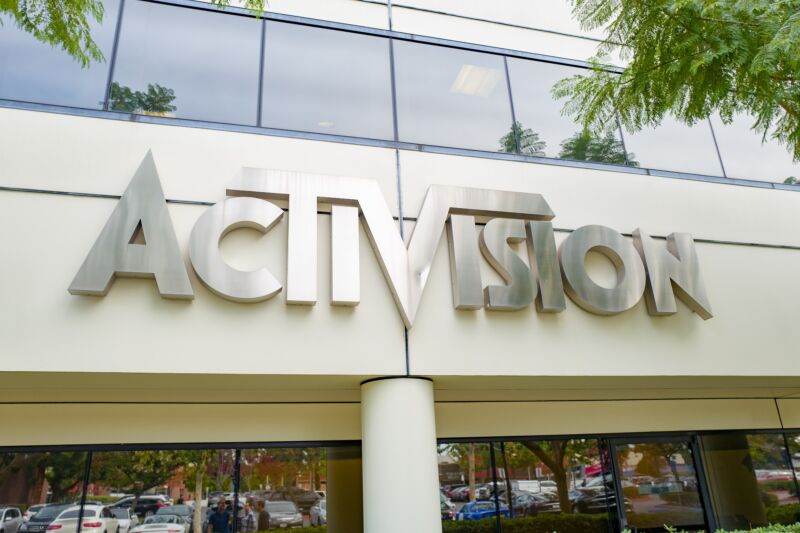Legal eagles —
Game maker says it “could raise serious questions about… underlying investigation.”
Kyle Orland
–

Enlarge / Activision’s Los Angeles offices.
Getty Images
Update, October 21: In a response filed with the court Wednesday, the California DFEH calls Activision Blizzard’s request for a stay an “improper procedural vehicle based on a substantive nonissue.” The company “hopes to conjure a scandal from these mundane facts” and is misreading the relevant rules, the DFEH writes.
The DFEH says the two lawyers at the center of the complaint were only minimally involved in the case against Activision Blizzard, in contrast to other filings that have alleged they helped lead the investigation. Further, the DFEH writes, “Activision can point to no actual or even hypothetical harm. The alleged harm (that the DFEH lawyers ‘obtained confidential information about Activision Blizzard during their employment with the EEOC’) is simply the typical harm of being a litigation defendant.”
Original Story:
In a new legal filing, Activision Blizzard is pointing to alleged conflicts of interest within California’s Department of Fair Employment and Housing (DFEH) in an effort to delay or stymie the state agency’s continuing lawsuit over alleged discrimination and sexual harassment at the company.
Conflict claims
Those who have been following California’s slowly unfolding case against Activision since it first became public in July may remember that the federal Equal Employment Opportunity Commission (EEOC) brought a similar but separate lawsuit against the company last month. Activision Blizzard quickly agreed to a consent decree to settle that federal case, setting up an $18 million restitution fund for affected employees in the process.
Earlier this month, though, California’s DFEH filed an objection to that federal settlement, saying in part that it had a “potential prejudicial impact on the state of California’s pending enforcement of [the Fair Employment and Housing Act].” The settlement, California argued, might cause “irreparable harm” to the DFEH’s case and “may result in the waiver of state claims relevant to DFEH’s pending case and the destruction or tampering of evidence necessary to DFEH’s case.”
The EEOC answered back almost immediately, alleging in its own filing that two DFEH attorneys who “play leadership roles within the [DFEH]” previously worked for the EEOC and “helped to direct the EEOC’s investigation… against Activision Blizzard.” That dual representation in separate state and federal cases created a conflict of interest barred by the California Rules of Professional Conduct, according to the EEOC.
“For this reason, the intervention motion should be disallowed and DFEH attorneys should be barred from providing work product to, or advising, new counsel in connection with these intervention proceedings,” the EEOC wrote.
Blizzard sees an opening
Now, Blizzard is trying to take advantage of that alleged conflict of interest to delay the state case against it and to potentially disqualify many of the DFEH attorneys involved. In a new filing, the company asks the court to pause proceedings in the case to give it time to perform legal discovery and see if “disqualification or other remedies exist.”
Beyond the two attorneys accused of a direct conflict of interest, Activision Blizzard also argues that “violation of these rules could lead to the disqualification… of the entire group of DFEH attorneys with whom they have worked” as outlined in the California Rules of Professional Conduct. Activision Blizzard also alleges another possible rules violation by DFEH attorneys who improperly reached out to Activision Blizzard employees and urged them not to retain private counsel.
“If ethical violations did occur, then allowing the attorneys at the center of the violation to continue to prosecute the case against Activision Blizzard would continue to cause irreparable harm, both to Activision Blizzard and to the DFEH’s ability to prosecute this case,” the company writes. The conflict “could raise serious questions about the DFEH’s underlying investigation,” the filing continues, adding that “the integrity of the DFEH’s investigation itself—not just the prosecution of the current action—could be called into question.”
This new legal drama might seem like a technicality without much bearing on the actual discrimination and harassment complaints at the heart of the case. Still, the result could be to Activision Blizzard’s benefit, weakening or at least delaying the case that the state had been building against it.
“This is a pretty massive thing, and if true would call into question large portions of the DFEH process,” Michigan attorney and Virtual Legality host Richard Hoeg wrote on Twitter following the initial EEOC conflict allegations. “It might even provide Activision with its own defense to the original suit.”
Meanwhile, Activision Blizzard Executive Vice President for Corporate Affairs Fran Townsend published a letter to employees revealing that “more than 20 individuals have exited Activision Blizzard and more than 20 individuals faced other types of disciplinary action” as a result of the company’s internal investigations into misconduct. Townsend also notes “an increase in reports [of misconduct] through various reporting channels” in recent months and that the company is “preparing to triple our investment in training resources” to let employees know what to look out for. Nineteen people are now working full-time on the company’s ethics and compliance team.
Activision Blizzard has approximately 9,500 employees, according to a 2020 SEC filing.

